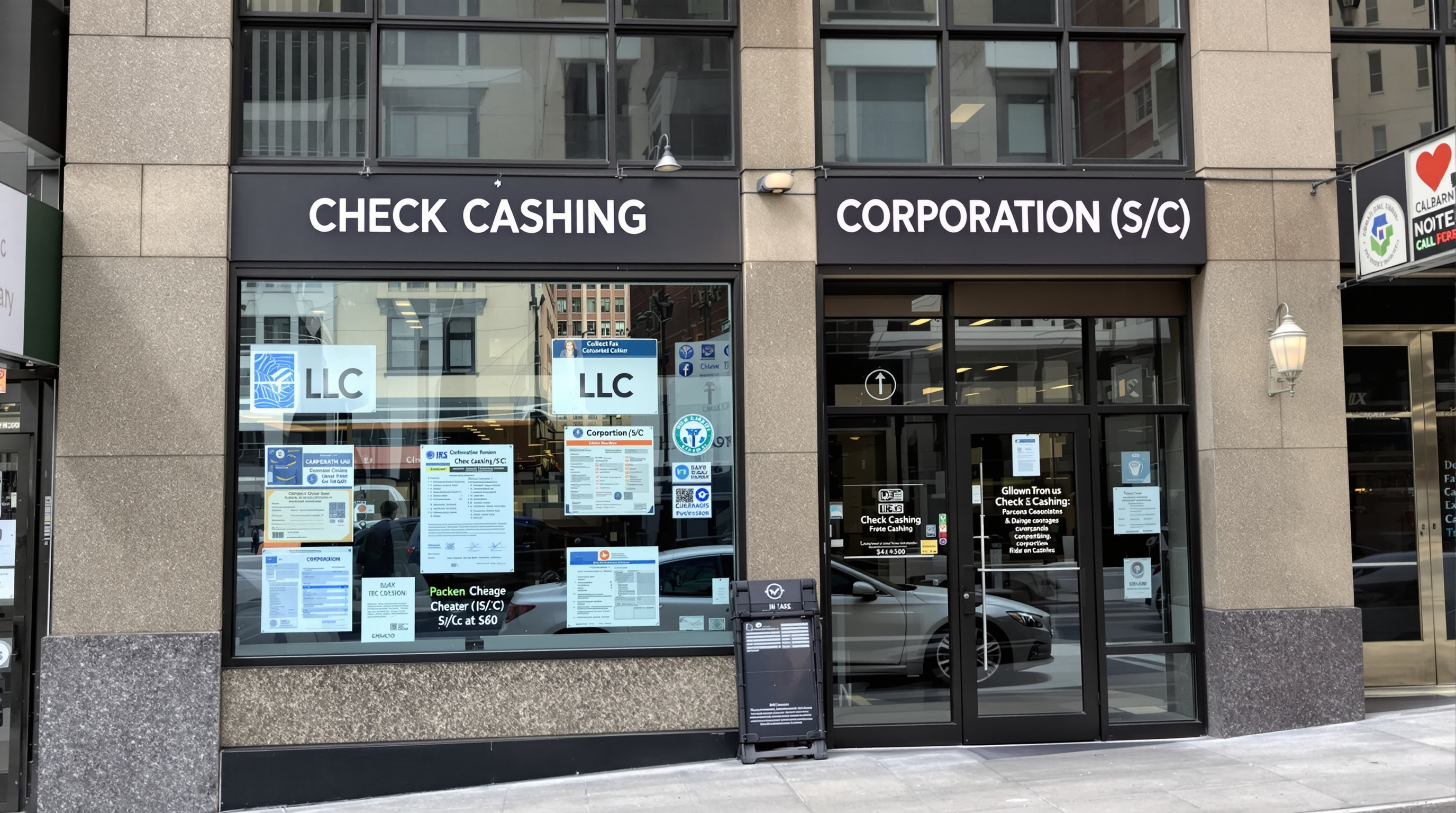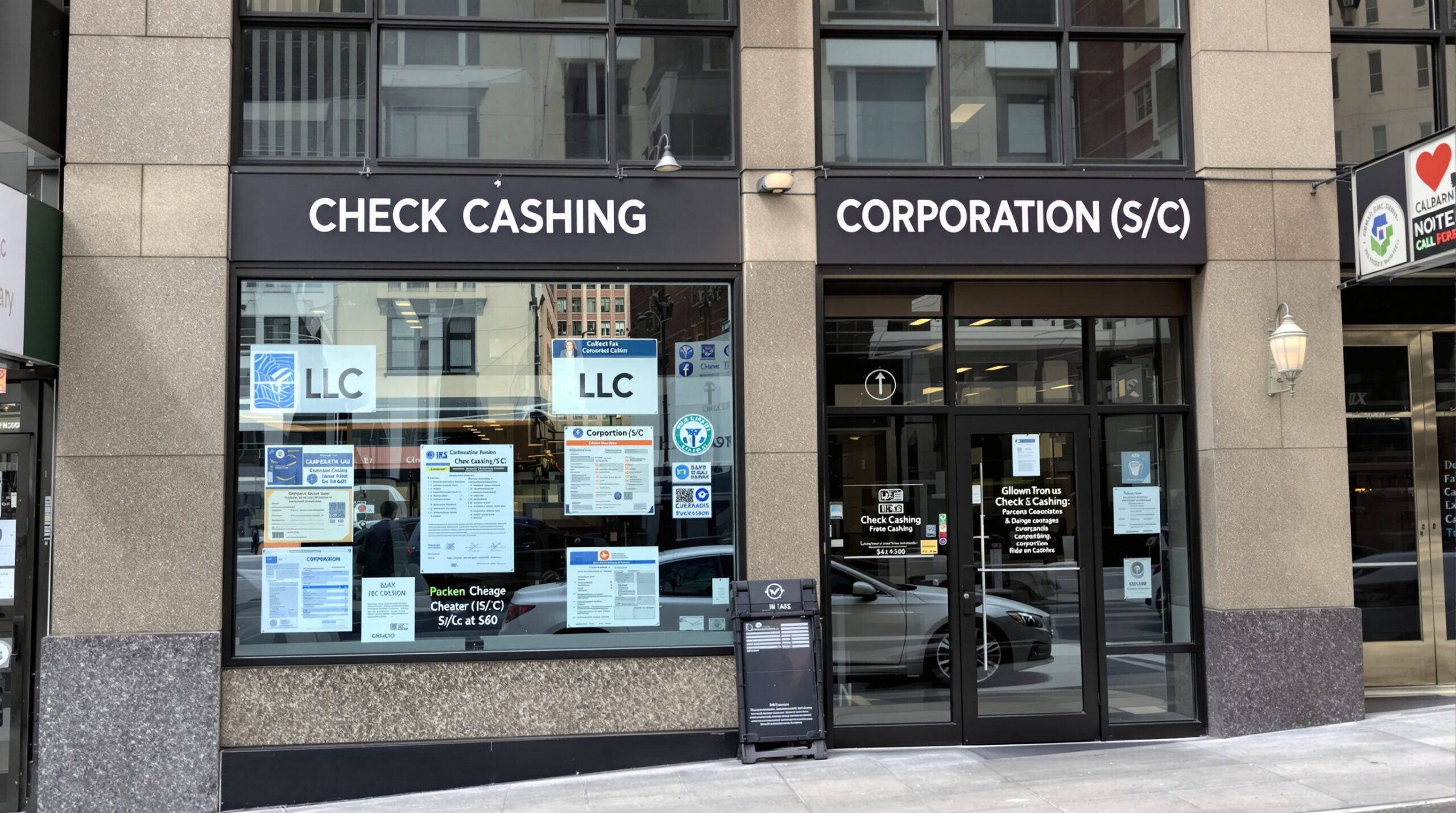PLS Chicago Check Casher: LLC, S Corp, or C Corp? The Entity Question That Can Change Everything for Illinois Business Taxes

Most Illinois check cashing businesses think picking a legal structure is just red tape. But here’s the real cost: choose wrong, and you can overpay $25,000 or more to the IRS before you even blink. The truth is, the PLS Chicago check casher corporation LLC S or C corp decision is more than paperwork—it’s the core tax play that dictates owner pay, compliance risks, audit odds, and your long-term wealth. The average owner makes this call once, gets it wrong, and spends years patching up payroll, write-offs, and IRS notices. It doesn’t have to be that way.
When evaluating the PLS Chicago check casher corporation LLC S or C corp setup, the real pivot lies in IRS classification and timing. Filing Form 2553 (S Corp) or Form 8832 (C Corp) by the 75-day rule determines not just how profits are taxed but whether you can split income into payroll versus distributions. Miss the election deadline, and your business defaults to sole proprietorship taxation under Schedule C—triggering full 15.3% self-employment tax on every dollar earned. The smartest operators file proactively in January to secure the most efficient tax posture for the entire fiscal year.
This California tax strategist is going to break down—using plain numbers—how entity choice shapes taxes for Chicago check cashing businesses in 2025. Real-world KDA case studies, myth-busting, IRS rules, and every deduction angle included. If you’re tired of working twice as hard to earn half as much, this one’s for you. This information is current as of 10/28/2025. Tax laws change frequently. Verify updates with the IRS or your state if reading this later.
Quick Tax Fact: LLC vs. S Corp vs. C Corp for Check Cashers
If you own or operate a check cashing storefront in Chicago, your entity choice decides:
- How much salary you must take (and what tax rate applies)
- What counts as a business write-off
- Your liability for payroll and self-employment taxes (15.3% in many cases)
- Whether profits get taxed once or twice
- Audit triggers specific to your industry
Bottom line: An LLC taxed as an S Corp can save $11,400–$30,000 a year in payroll and self-employment tax compared to a sole proprietor, but if you grow or sell the business, a C Corp can be worth that or more in capital gains savings. There is no “best”—only what’s best for your growth profile, profit margin, and owner goals.
How Entity Choice Drives Real Tax Savings (or Traps)
Start by clarifying: Illinois check cashers typical margins are tight—3–15% net profit on $600K–$2.5M gross receipts per location. Every percentage point counts. The entity you select impacts:
- Self-employment tax (LLC default/Schedule C) ≈ 15.3% on all net profit
- Reasonable salary (S Corp/1120S) ≈ 6–12% payroll tax on just W-2 wage
- Double taxation on dividends (C Corp/1120) ≈ 21% federal + 9.5% Illinois + 23.8% on dividends
The pivot point is whether you’re optimizing for current-year cash flow (LLC taxed as S Corp), long-term wealth (C Corp with retained earnings or sale), or limiting audit risk (strict S Corp compliance). For a deep dive in LLC structuring, see our ultimate LLC tax blueprint.
KDA Case Study: Check Casher Owner—$21,800 Saved With S Corp Strategy
Pete (not his real name), a 1099 owner-operator, ran two PLS-style check cashing stores in Chicago with $890,000 in receipts and $118,000 in net profit in 2024. He operated as a single-member LLC on Schedule C. He was paying nearly $18,000 a year in self-employment tax, plus state and federal—losing cash flow and IRS red flags for inconsistent deductions.
KDA restructured his entity as an LLC taxed as an S Corp. Pete began paying himself a $56,000 W-2 salary (market rate for owner-operators, see IRS S Corp guidelines), funneling the remaining profit ($62,000) as distributions—a move that lowered his payroll/self-employment taxes by $9,480 in year one. We layered in compliance-driven documentation and updated his general liability insurance, avoiding the audit triggers plaguing many Schedule C filers in financial services.
On top of that, we identified more than $12,300 in overlooked deductions (security upgrades, software, armored transportation, compliance training). Pete paid KDA $4,200 for the strategy. Net result: $21,800 in ongoing annual tax savings, 5.1x first-year ROI, plus lower audit risk. Pete’s only regret: not doing it five years sooner.
Ready to see how we can help you? Explore more success stories on our case studies page to discover proven strategies that have saved our clients thousands in taxes.
Entity Types for Illinois Check Cashers: Comparing LLC, S Corp, and C Corp
Here’s how each structure impacts a Chicago check cashing business:
LLC (Default: Sole Proprietorship)
- Profits taxed on Schedule C
- All profit subject to 15.3% self-employment tax
- Flexibility in management, but limited audit shielding
- Proactive deductions needed (security, rent, tech, etc.)
LLC Taxed as S Corp
- Report on IRS Form 1120S and Illinois Form IL-1120-ST
- Owner receives “reasonable” W-2 salary (only salary counts toward payroll tax)
- Remainings profit hits as K-1 distributions (not subject to payroll/self-employment tax)
- Better retirement plan contributions possible
- More IRS scrutiny but far less self-employment tax (see Pete’s case above)
C Corporation (Inc)
- Reported on IRS form 1120 and Illinois Corp tax
- Retained earnings taxed at 21% federal, 9.5% Illinois
- Distributions to owners (“dividends”) taxed again (double taxation—23.8% rate)
- Full medical/dental write-off options; attractive for eventual sale with potential 1202 stock gains exclusion
- High administrative burden, but shields owner from some liabilities
Pro Tip: Only an S Corp can legally split profit into payroll and distributions for a check casher that is not a C Corp—Schedule C/LLCs must pay full self-employment tax. Many “C Corp” check cashers still file as S Corp for tax; check your IRS Form CP261 or review your last 1120S/1120 filing to confirm.
Audit Triggers and Compliance Red Flags for Check Cashers
Financial services businesses—especially check cashers—face above-average audit risk (estimated 2.0–2.5x the US business rate, per recent IRS statistics). Red flags include:
- Large cash transactions without proper Form 8300 filings
- Payroll reported inconsistently across W-2s and insurance audits
- Overstated “security costs” and cash discrepancies
- Mismatched owner pay between bank deposits and payroll returns
PLS Chicago check casher corporation LLC S or C corp structures can lower audit risk—but only if payroll, distributions, and books match both IRS and Illinois standards. Schedule C check casher businesses see audit rates exceeding 1–2% in some inspection sweeps (source: IRS Publication 583). S Corp or C Corp compliance (with well-documented reasonable salaries and clear business purpose) reduces audit frequency and helps defend deductions under scrutiny.
How to Pick the Right Entity for Your Check Cashing Operation
This is not a one-size-fits-all answer. Here are the top strategic frameworks KDA uses for Chicago check cashers deciding between LLC, S Corp, and C Corp for 2025:
- Annual Net Profit Under $80,000?—LLC default or S Corp, but run the math: S Corp typically saves $6,000–$9,000+/year after payroll compliance costs.
- Profit Over $100,000 But Not Planning to Sell Soon?—S Corp often maximizes personal tax benefit, reduces self-employment taxes, and adds IRA/401k potential.
- Building to Sell or Raise Capital?—C Corp allows for outside investors and offers the rare QSBS (Qualified Small Business Stock) exemption—potential for 0% capital gains under certain conditions if you qualify (see IRS Publication 551), but double taxation is real until sale.
- Multiple Owners or High Audit Risk?—Structuring as an LLC taxed as S Corp with established payroll policy is usually most flexible, audit-defensible, and owner-friendly in practice.
Bottom line: Every $1,000 in profit, entity structure decides whether you keep $700–$850 after taxes or $500–$600. That’s your operating margin, retirement, and future expansion fund.
Common Mistake That Costs Chicago Check Cashers Thousands
Red Flag Alert: The number one mistake—mixing owner draws with payroll. IRS audits focus on cash access: if you take money “off the top” outside S Corp payroll, you will likely owe back self-employment or payroll tax, with penalties and interest. Inexperience with “reasonable compensation” is a close second (owners paying themselves below-market salary, then drawing the rest as distributions—this is a classic IRS audit magnet). Double check payroll, reconcile with insurance audits, and have your books tie out to every Form 1120S/941 quarterly payroll filing.
Pro Tip: Use documented industry salary surveys (or KDA payroll benchmarks) to set compliant owner pay (often $46,000–$60,000 for single-location Chicago check cashers). Document how you arrive at the number (IRS Publication 15) and retain for at least 6 years.
Follow-Up Questions: What if I Want to Change My Entity Later?
Can I convert from LLC to S Corp or C Corp? Yes, an LLC can elect to be taxed as an S Corp (IRS Form 2553) or C Corp (IRS Form 8832) at the federal level with proper, timely filing. Illinois also requires an Entity Classification Election form. Timing is everything: miss the election, and you may forfeit tax benefits for the year (IRS Form 2553 guidance).
How do owner pay and retirement change? S Corp salary becomes W-2 income—basic 401k and retirement advantages open up. C Corp can sometimes allow for more robust health benefit payouts (deductible by the company), but triggers double tax on distributions.
FAQ: More on Taxes for Chicago Check Cashers
How does Illinois taxation compare on these entities?
Illinois applies a 9.5% corporate tax to C Corps, while S Corp and LLC pass-through entities are subject to personal state income tax (4.95% individual). Don’t ignore the City of Chicago “business license” and compliance fees—factor into your entity analysis.
Can I deduct ALL my security and cash handling expenses?
Yes, but you must document every cost—itemize alarm systems, guard services, armored transport, safes, and include vendor receipts. The IRS will review these in an audit (Publication 535).
What’s the cost to change structures mid-year?
Plan for $750–$2,500 in professional/legal fees and potential back-taxes if not done cleanly (especially when setting “reasonable compensation” retroactively). The savings are almost always worth it over 12–18 months—but get pro help.
Action Steps: Secure Your Structure and Slash Your Illinois Tax
- Run a “what if” scenario showing Schedule C vs. S Corp payroll costs vs. C Corp double tax
- Document (and update) every owner distribution, salary, and business expense
- Align your insurance audits and payroll filings now—don’t let mismatched data set off IRS alarms in 2025
- Book a tax planning session with a strategist who understands both Illinois and federal rules—potential savings often exceed $9,000/year for typical check cashers
- Review your entity election forms on file (Form 2553, Form 8832) and keep originals for six years to defend your status in audit
Book Your Clarity Call: Stop Overpaying and Start Optimizing
If choosing between LLC, S Corp, or C Corp for your Chicago check cashing business feels overwhelming—or if your current structure isn’t delivering maximum financial benefit—stop guessing! Our firm has helped check casher owners save $10,000–$40,000 in annual taxes with structure tweaks alone. Book a personalized strategy session now and position your business for real savings and lasting security. Click here to book your consultation now.




